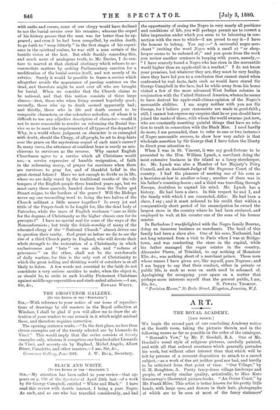BLACK AND WHITE.
(To THIS EDITOR OF TIll SPECTATOR:"] SIR,—My attention has been called to your review—that ap- pears on p. 530 of the Spectator of April 24th last—of a work by Sir George Campbell, entitled "White and Black." I have read this review with double interest, I being a pure Negro. As such, and as one who has travelled considerably, and had the opportunity of seeing the Negro in very nearly all positions and conditions of life, you will perhaps permit me to correct a false impression under which you seem to be labouring in con- nection with the race to which—I am proud to say it—I have. the honour to belong. You say :—" A successful negro mer- chant" (writing the word Negro with a small n) "or shop- keeper seems to be unheard of ;" and you quote from the work you review another sentence in keeping with yours, namely,— " I have scarcely found a Negro who has risen in the mercantile. world higher than an apple-stall in a market." I do not know- your premises, but whatever they are, they must be very faulty, since they have led you to a conclusion that cannot stand when confronted by real facts, facts such as would have stared Sir George Campbell in the face, had he while away from his home. visited a few of the more advanced West Indian colonies in conjunction with the -United States of America, whence he seems to have derived his apple-stall-climax-opinion of the Negro's mercantile abilities. I am angry neither with you nor Sir George, for I believe your statements are made in good-faith ; still, I cannot but express my surprise that he or you should have joined the ranks of those, with whom the world swarms just now,. who are constantly asserting painful things that have no rela- tion to truth in connection with the Black Man. I need hardly do more, I am persuaded, than to refer to one or two instances of Negro mercantile success, to show how very unfair is that wholesale assertion by Sir George that I have taken the liberty to direct your attention to.
When I was in St. Vincent, it was my good-fortune to be presented to the Hon. William Lynch, a merchant doing the most extensive business in the island as a fancy storekeeper, &c. Mr. Lynch was also a Member of her Majesty's Privy Council, and an Assistant-Judge of the Supreme Court of the country. I had the pleasure of meeting one of his sons as a barrister-at-law in another colony ; another of them was in his father's counting-house ; and a third was travelling through Europe, doubtless to expand his mind. Mr. Lynch has a history. He had been a slave. In this respect he and I, and the family with which I am connected, differ. He had been a slave, I say ; and it must redound to his credit that within a comparatively short period of his emancipation he owned the- largest store in the country where he had been enslaved, and employed to wait at his counter one of the sons of his former master.
In Barbadoes I was 'delighted with the Negro family Bourne, doing an immense business as merchants. The head of this family had been a slave also. One of his sons, Nathaniel, had not long returned from a visit to Paris when I was at Bridge- town, and was conducting the store in the capital, while- his father managed the sugar estates in the country. Alexander Pierre, of Trinidad, to say nothing of Monsieur Elie, &c., was nothing short of a merchant prince. These men whose names I have given are, like myself, pure Negroes ; and I am happy to say that their conduct, either in private or public life, is such as none on earth need be ashamed of. Apologising for occupying your space on a matter that perhaps more interests myself than the general public, I am,.


































 Previous page
Previous page